- Home
- Mollie Cox Bryan
Scrapped
Scrapped Read online
Also by Mollie Cox Bryan
SCRAPBOOK OF SECRETS
SCRAPPED
Mollie Cox Bryan
KENSINGTON PUBLISHING CORP.
http://www.kensingtonbooks.com
All copyrighted material within is Attributor Protected.
Table of Contents
Also by
Title Page
Dedication
Acknowledgments
Chapter 1
Chapter 2
Chapter 3
Chapter 4
Chapter 5
Chapter 6
Chapter 7
Chapter 8
Chapter 9
Chapter 10
Chapter 11
Chapter 12
Chapter 13
Chapter 14
Chapter 15
Chapter 16
Chapter 17
Chapter 18
Chapter 19
Chapter 20
Chapter 21
Chapter 22
Chapter 23
Chapter 24
Chapter 25
Chapter 26
Chapter 27
Chapter 28
Chapter 29
Chapter 30
Chapter 31
Chapter 32
Chapter 33
Chapter 34
Chapter 35
Chapter 36
Chapter 37
Chapter 38
Chapter 39
Chapter 40
Chapter 41
Chapter 42
Chapter 43
Chapter 44
Chapter 45
Chapter 46
Chapter 47
Chapter 48
Chapter 49
Chapter 50
Chapter 51
Chapter 52
Chapter 53
Chapter 54
Chapter 55
Chapter 56
Chapter 57
Chapter 58
Chapter 59
Chapter 60
Chapter 61
Chapter 62
Chapter 63
Chapter 64
Chapter 65
Chapter 66
Chapter 67
Chapter 68
Chapter 69
Chapter 70
Glossary of Basic Scrapbooking Terms
Making Your Own Scrapbook of Shadows
Other Ideas For More Reflective Scrapbooking
Scrapbook Essentials for the Beginner
Advice on Cropping
Frugal Scrapbooking Tips
Teaser chapter
Copyright Page
For my favorite time travelers,
dream surfers, and circle dancers—
Vicki and Richard
Kate
Fran, Kathy, and Dawn
Acknowledgments
Special thanks to Deena Warner for rune research and Dr. Melinda Fergusen for help with medical questions. I’d also like to thank my family and friends, along with my beta readers, Jennifer Feller, India Drummond, and Leeyanne Moore. Much gratitude to the Kensington team: Martin Biro, Adeola Saul, Alexandra Nicolajsen, along with all the sales reps and marketing crew selling those books. You are so appreciated. I’d also like to thank bookstores and the mystery writing community—both have supported me in countless ways. Much gratitude to a group of writing friends who are never too busy to answer questions, lend a shoulder, or extend themselves to me: Marie Bostwick, Mary Burton, Joanna Bourne, Joanna Campbell Slan, Joann Ross, Emilie Richards, Hallie Ephron, Therese Walsh, Alison Hart, Elizabeth Massie, Matthew Warner, and Clare O’Donohue. Heartfelt thanks to Sharon Bowers, agent extraordinaire.
But mostly, I want to express to readers my heartfelt thanks. I’m so glad you love my scrapbookers as much as I do. More to come.
Mollie
Chapter 1
Spending Sunday afternoon watching the police drag a body from a river was not what Annie had planned for the day. She was kicking a soccer ball around in the backyard with her boys when she was called away.
She took a deep breath as she walked through the crowd and over the yellow tape, which roped off the section to the river where the police and paramedics had gathered. Red and orange lights circled and flashed. Ducks swam in the river. A comforting arm slid around a woman standing in the crowd. A group of Mennonites stood from the bench they were sitting on and lowered their heads. What were the Mennonites doing at the park on a Sunday? Odd.
Across the river, where the park was more populated, Annie saw children playing on the swings and bars on the playground. Also, a rowdy game of basketball was taking place in another corner of the blacktopped surface. In the grassy area, a Frisbee was being thrown between three friends. Groups of mothers had gathered on the benches, trying not to alert their children or to look too closely at what was happening across the rushing Cumberland Creek River.
A hush came over the crowd on this side of the river as the nude body of a small red-haired woman emerged from the water in a torn sack, her hair dangling over the side, along with a foot. The body, mostly shrouded by the shredded sack, was placed on the ground. Cameras flashed—again.
Every time Annie viewed a dead person, she silently thanked one of her old journalism professors, who had insisted all his students witness autopsies. “If you’re going to get sick, it’s better here than in front of a cop. He’ll lose all respect for you.”
“Hello, Annie,” said Jesse, one of the uniformed police officers she had come to know over the past year of reporting about Maggie Rae and her family. Now Annie found herself under contract with a publisher to write a book about the case, which she was just finishing up. But she was still freelancing for the Washington Herald from time to time and was called in this morning to check this out. Was this incident another murder in the small town of Cumberland Creek?
“Hi, Jesse. Where’s your boss?”
“Behind you,” came his voice. Then Detective Bryant walked by her to look over the body more closely. His eyebrows knit, and he leaned in even closer, sliding gloves on his hands. “What the hell is this?”
“Scratches?” Jesse said, looking closer.
Annie was hoping to avoid looking closely at the actual body. Although she’d seen way too many dead bodies during her tenure as a reporter, it never was any easier. And she thought she’d left this behind her when she left Washington. She’d gotten sucked back into reporting during the Maggie Rae case. She was just beginning to get some breathing space—her book sent off to the publisher, nothing much else to report on in Cumberland Creek—and now this. She hoped it was an accident and not a murder.
“No,” Detective Bryant said. “Look closer. They are little markings of some kind. I can’t quite make them out. Where’s the coroner?”
Annie forced herself to look at the gray-blue arm the detective was holding gingerly in his hand. Okay, it’s just an arm, she told herself. But she could see the markings.
“It looks like Hebrew,” she blurted.
“Really?” Jesse said.
“Look again. That’s not Hebrew,” Detective Bryant said.
Annie leaned in closer. She had to admit, now that she was looking closer at it, that it didn’t look like Hebrew at all.
The detective turned to the coroner as he walked closer to the group. “I want close-up photos of these markings. Photos from all angles.”
“Must be a recent drowning,” the coroner said. “If that’s the cause of death.”
“What makes you say that?” Annie asked.
“You can still recognize the body as a person. If it goes too long, it’s difficult.”
Annie’s stomach twisted.
As Detective Bryant dropped the arm, she viewed the face of the victim between the clusters
of shoulders of the police as they backed away. Young. Blue eyes staring blankly. Tangled red hair. Her face showed no sign of struggle—like a grimace or a look of anger or regret. The woman looked like a gray-blue rubber doll. Of course, what expression would a dead person have but none?
“Who found her?” Annie asked.
“It was a runner this morning, a Josh Brandt,” Detective Bryant answered. “He’s home now. I’d appreciate it if you’d give him some time before you zoom in for the kill,” he said and grinned, his blue eyes sparkling.
Annie refused to engage with his taunting. She watched as he brushed away a strand of red hair from the young woman’s face. It was the most gentle gesture she’d ever seen him make.
“So what do you think the markings are?” Annie asked the detective.
“I’ve no idea,” he said. “But I’m going to find out. I have a friend that specializes in symbols—if that is what these markings are.”
“Will you let me know?”
“Sure. I’ve got nothing better to do,” he said and smirked.
“Any idea who she is?”
“None,” he said. “Check back with us tomorrow.”
“Thanks,” she said and walked away.
It was a beautiful fall day—so much color—golds, reds, crimson, orange, yellow. Fall in Cumberland Creek was as colorful as any painting or photo. It could be an advertisement for the way fall should look, with its mountains, colors, and crisp blue skies.
Annie looked off into the distance at the mountains. Bryant would probably not let her know about those symbols, Annie decided. She would have to research them herself. She was sure of it. She stood on the dirt path and quickly sketched some of the symbols—if that was indeed what they were, and not odd scratches from a struggle with rocks or the limb of a tree. If they were simply scratches, though, the markings were weirdly smooth. Her stomach twisted again. Another murder. They just needed to confirm the cause of death and call it one—but Annie felt that it was. That the body was in a sack made her more certain, and she wondered if the sack had been weighted before the river’s rocks and current slashed it to pieces.
She walked along the riverside path toward Cumberland Creek proper, where she lived. She walked right past Vera’s dancing school, closed, as were all the town businesses, because today was Sunday. It wouldn’t do anybody any good to open on Sunday. There would be no customers. Most of the population in Cumberland Creek spent Sundays in church and at home—except for Annie, Vera, and their friends, who were usually nursing mild hangovers from the Saturday night crop, when they gathered to scrapbook in Sheila’s basement.
Annie reached the sidewalk, which veered toward Vera’s house. When she’d talked with Vera this morning, she’d said Cookie was coming over and was planning to watch Vera’s daughter, Elizabeth, and make her special pumpkin soup, while Vera went to the grocer’s. Annie’s mouth began to water. The woman could cook.
She could also do some yoga, twisting her body into all sorts of poses as if it were nothing at all. Annie loved Cookie’s Friday evening class. She had taken classes when she lived in the D.C. area, but none were like this. Cookie created a safe environment in which you could explore and reach out for new poses—she was not a teacher who pushed you to do anything painful.
Cookie explained to them one evening how she kept a yoga journal as a beginner and how it helped for her to see how much she’d progressed. Now Annie was working on something similar, a combination scrapbook or dream book of sorts—mundane, with ordinary beginning techniques interspersed with writing about a pose or thought. She was using self-portraits. This was a different kind of scrapbooking than what Annie had first learned from the Cumberland Creek crop; it was more like art journaling.
Annie thought about stopping by for a few minutes before heading home, but she should be getting home to Mike and the boys. But it would be nice to see her friends after witnessing the disturbing events at the park. Of course, she’d have to fill them all in.
“Oh God, there you are!” Sheila came around the corner, nearly knocking Annie over. Her hair needed brushing, her glasses looked crooked, and her T-shirt was a wrinkled mess.
“What’s going on?” Annie said, steadying herself. Why was she so tired today?
“Did you hear? They found a dead body in the river,” Sheila said, panting.
“Man, this place is amazing,” Annie said. “News travels so fast.”
“What?” Sheila said.
“I was just there,” Annie said.
“Well, for heaven’s sake,” Sheila said, taking her by the other arm. “Are you heading to Vera’s place?”
Annie nodded. Okay, so she wouldn’t stay long.
When Vera opened the door, smiling, the smell of pumpkin, cinnamon, and cumin, with its promise of warmth, met Annie, the image of a drowned young woman fresh on her mind.
Chapter 2
“Well, if it isn’t the scrapbook queen, looking like hell on a Sunday afternoon,” Beatrice said to Sheila as she walked in the kitchen, where they were all gathered.
Sheila waved her off and walked by her. Vera just shook her head. Sheila and Vera were best friends from childhood, and Beatrice loved to pick on Sheila, just for the fun of it.
“Nice to see you, Bea,” Annie said.
“At least someone around here has some manners,” Beatrice said.
“What are you doing here?” Annie asked.
“I came to see my grandbaby and was just on my way out. The child is sound asleep.”
“I went to the store, came back, Mom was here, and Cookie had things under control,” Vera said.
Cookie poked her head in from around the corner. “Yes, Elizabeth went straight down after you left. I made soup and tried to get your mother to stay.”
“I will now,” Beatrice said. “If everybody else is going to eat the vegetarian organic stuff she calls food, I guess it can’t be so bad.”
Beatrice hated to admit it, but the pumpkin soup did smell heavenly. But she thought all of this vegetarian, back-to-the-earth stuff was nonsense. She suspected that if any of these young, flighty types had to survive from “living from the earth,” they wouldn’t know the first thing about it. But she couldn’t help but like this Cookie—even though she had many of the characteristics Beatrice would have despised in anybody else.
First, she was too damned thin—even thinner than Annie. The woman looked like she needed a big, thick, bloody steak. She was pale and wispy, with long black hair, which she sometimes pulled off her face with a thick, colorful headband. Eastern-looking silver jewelry always dangled from her. Her eyes were almost unnaturally green, and she carefully applied a bit too much eye make-up. While Vera, her own daughter, changed hair color more frequently than anybody she’d ever known, Beatrice preferred the natural look.
Cookie was a yoga teacher and taught classes in Vera’s dance studio. Yoga was a good thing, Beatrice knew, but this woman took herself a bit too seriously with all the “Namastes” and “Peace be with yous.” Who did she think she was? A divine messenger?
Ah, well, she chalked it up to youth. Basically, Cookie was a good sort—very good with Elizabeth, Bea’s one and only granddaughter. She sat down at the kitchen table with the other women. God knows what they were chattering about. She wasn’t paying a bit of attention. She suddenly thought of going upstairs and waking up Elizabeth just so she could hold her, play with her. Of course, she’d never do that—not in front of Vera, anyway.
“Did you hear me?” Vera was suddenly sitting next to her. “A drowned person washed up in the park today.”
“What? In Cumberland Creek?” Beatrice said, clutching her chest. Cumberland Creek, population twelve thousand, going on twenty thousand or so. When Beatrice was a girl, there was a fuss about the population reaching 750. It was two thousand for twenty years or so. She lost count a few years back with all the new housing development on the west side of town. McMansions.
“Yes, in the river at the park,” V
era said. “Scary.”
“I imagine. Who was it?” she asked Annie, who was sitting down at the table next to Vera.
“I have no idea. Detective Bryant said they might know her name by tomorrow.”
“Her?” Beatrice replied.
“It was sort of hard to tell, but there was a lot of long red hair,” Annie said, twisting her own wavy black hair behind her ear.
“Hmm. I don’t know of many redheads around here. Do you? Of course, sometimes I feel like I don’t know half the people here anymore.”
“Could be from somewhere else,” Annie said, just as bowls of steaming pumpkin soup were being passed around the table.
The scent of the spiced pumpkin reached out and grabbed Beatrice. The scent of pumpkin, spiced with cinnamon and cumin, filled the room. Suddenly she was nearly salivating in anticipation. She reached for a slice of the crusty whole wheat bread—still warm from the oven—and spread butter on it. Goodness, Cookie had gone to a lot of trouble; she had even baked bread.
“Great soup, Cookie,” Vera said and sighed. “You didn’t have to do this. I wasn’t expecting you to bake bread . . . just watch Lizzie while I went out for a bit of exercise and groceries.”
“Now, don’t worry about it,” Cookie said. “Since she went right to sleep, I had some time on my hands. I just wanted to help out. I know how hard it can be. I was raised by a single mom.”
Beatrice grimaced at the phrase “single mother,” which was not what she wanted for her daughter, who wouldn’t let her ex move back in—no matter how much he begged. Thank the universe, Bill had moved out of Beatrice’s house and into his own apartment, finally. Beatrice hoped that it would work out—for the baby’s sake—but Vera wasn’t interested. Beatrice couldn’t blame her for that. Also, Vera was seeing a man in New York. They rarely saw each other, and Vera had yet to bring him home to Cumberland Creek. She stole away to New York when she could. Beatrice doubted that it was serious. Bill, however, was seething. Served him right.
So there was another unexplained death in the small, but growing town of Cumberland Creek. Beatrice mused that things had just calmed down from the Maggie Rae case. Just what the town needed: more media attention, more outsiders, as if the new McMansion dwellers on the outskirts of town weren’t enough for her and the other locals to manage. Beatrice hated to generalize about folks, but they all thought they were mighty important.

 No Charm Intended
No Charm Intended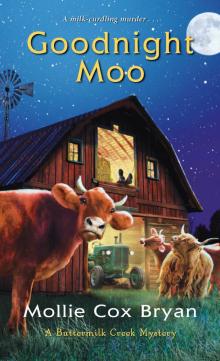 Goodnight Moo
Goodnight Moo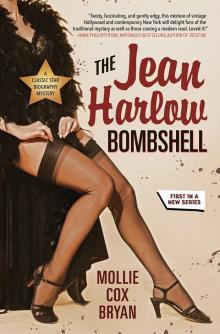 The Jean Harlow Bombshell
The Jean Harlow Bombshell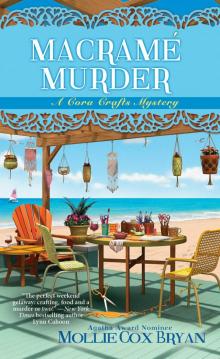 Macramé Murder
Macramé Murder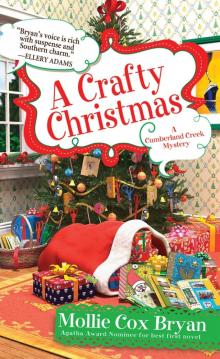 A Crafty Christmas
A Crafty Christmas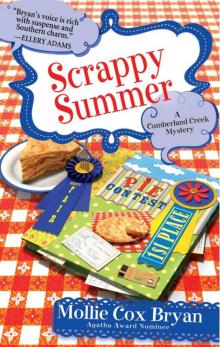 Scrappy Summer
Scrappy Summer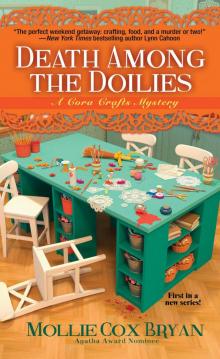 Death Among the Doilies
Death Among the Doilies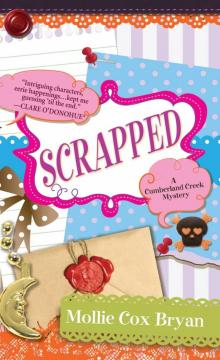 Scrapped
Scrapped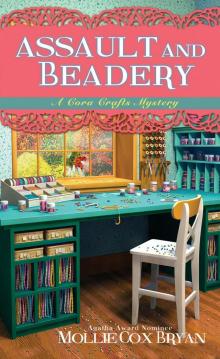 Assault and Beadery
Assault and Beadery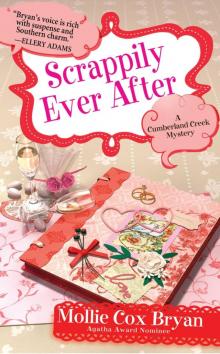 Scrappily Ever After
Scrappily Ever After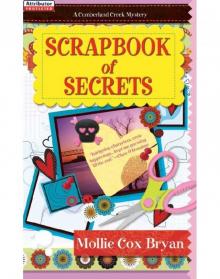 Scrapbook of Secrets
Scrapbook of Secrets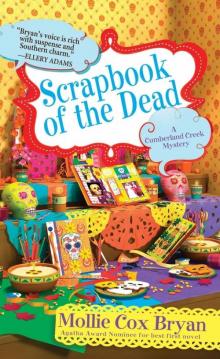 Scrapbook of the Dead
Scrapbook of the Dead